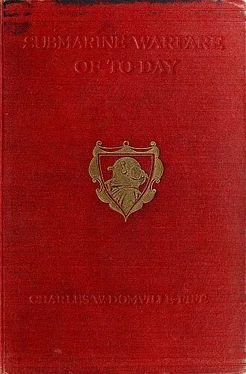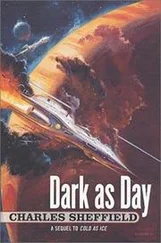Custom had taught the few civilian and the many naval and military inhabitants of Dunkirk to regard calm moonlight nights with very mixed feelings. It was seldom indeed that the Boche neglected such an opportunity for an air raid. Not merely one brief bombardment from the skies, but a succession of them, lasting from dusk until early morning, and repeated night after night while the weather remained favourable.
Owing to adequate preparations for such attacks the casualties were generally few, but the loss of sleep was nearly always great, unless the individual was so tired with the day’s or week’s minesweeping, spell in the trenches, or sea patrol that the “popping” of guns and the thud of bombs merely caused a semi-return to consciousness, with a mild, indefinable feeling of vexation at being momentarily disturbed.
To the majority, however, it meant not only the loss of sorely needed sleep, but also hard work under trying conditions. To realise fully what it is to be deprived of rest when the brain is reeling and the movement of every limb is an agony, it is necessary to have worked, marched and fought for days and nights incessantly, and then the moral as distinct from the material effect of successive air raids will be duly appreciated by those fortunate ones who spent the years 1914 to 1918 remote from the menace.
Although Dunkirk on this particular August night seemed uncannily quiet, the hour was not late. By Greenwich time it was but a few minutes past nine, and two bells had only just sounded through the many and diverse ships lying in tiers alongside the quays. So warm were the soft summer zephyrs, which scarcely stirred the surface of the water, that on the decks of many of these war-worn sweepers and patrols men lay stretched out under the sky in the sound sleep of exhaustion, while on the quays and at other points in the half-wrecked town steel-helmeted French sentries kept watch.
Of the British naval forces based on this little French seaport few were ashore, as, without special permission, both officers and men had to remain on their ships after sunset, and those not playing cards or reading in the cabins were lounging and smoking on deck. Blot out of the view the ruined houses, the shell-holes in the streets, the guns, the dug-outs and the sentries, and few scenes more unlike the popular conception of a big war base, with the enemy only a few miles distant, can be imagined.
But Dunkirk in that year of grace, 1917, did not always wear so peaceful a garb. There were frequent periods when the shells whistled over or on to the town, when the earth trembled from the concussion of high explosives, when buildings collapsed or went heavenwards in clouds of dust, when the streets were illumined with the yellow flash of picric acid, or were filled with clouds of poisoned gas, when ambulances clattered over the cobblestones, trains of wounded rolled in from the firing line and the killed and maimed were landed from the sea.
The first indication of the change from calm to storm came at the early hour of 10 p.m., when the air raid warning sounded throughout the town. On the quayside all was ordered haste. Mooring ropes were cast off with a minimum of shouting, and the larger ships moved slowly down the harbour towards the open sea. The few small vessels left seemed to crouch under the dock walls.
Sentries left their posts to take shelter in the great dug-outs, constructed of heavy timbers and sand-bags. These were situated at convenient points throughout the battered little town. In the houses some people descended to the cellars, but many remained wherever they happened to be, while in the cabins of the few ships which remained in harbour the games, the reading, the letter-writing and, in a few cases, even the sleeping went on undisturbed.
After a short interval of oppressive silence, during which time no light or sound came from the seemingly deserted town, a faint whir of propellers became just audible in the stillness of the summer night. Then it died away momentarily. Suddenly a bright glare, like that of a star-shell, lit up the roofs and streets, and almost simultaneously came the dull vibrating report of a bomb. It sounded from the direction of the cathedral. Searchlights flashed out from various points, but their powerful rays were lost in the luminous vault above. Guns roared and bright flashes appeared like summer lightning in the sky. Every few seconds the town trembled from the shock of exploding bombs, first at one point and then at another, but nothing could be seen of the raiding squadron. Pieces from the shells bursting overhead and fragments of bombs and shattered masonry fell like rain into the streets and into the waters of the harbour.
On the quayside a big aerial torpedo had made a crater large enough to bury the horse which it had killed in a near-by stable. A few seconds later another bomb fell close to a minesweeper and a fragment gashed the decks but did not penetrate them. In the cabins the concussion of almost every bomb which fell on shore was felt with curious precision. The glass of wheel-houses and deck cabins was shattered, and the rattle and thud on the decks and iron sides denoted the storm of falling metal.
The din of the raid went on for some time and then died away with a final long-range shot from “Loose Lizzie” on the hills behind. When all was clear heads appeared from hatchways, dug-outs and cellars. People searched the sky curiously in an endeavour to make sure that there was “no deception,” although from first to last nothing had been seen of the raiders except by those with the instruments, the searchlights and the guns. The latest news of the damage caused—two houses, a man and a horse—went from mouth to mouth. Then the summer night regained its tranquillity and Dunkirk slept.
* * *
The familiar boom sounded its loudest in the stillness of the night and the ground seemed to tremble the more violently because of the darkness. It was 1 a.m. The young moon had sunk beneath the horizon and a light film of cloud had drifted over the sky.
The old French reservist doing sentry-go on the quay glanced up with a shrug of indifference and slowly shouldering his rifle walked leisurely towards a dug-out. Searchlights became busy exploring the sky. This time their rays were not lost in the opaque blueness above, but went up in well-defined columns of light until reflected on the lofty clouds. Presently the beams concentrated and, when the eyes had grown accustomed to the glare, little white “butterflies” were seen circling in the upper air. Then the guns opened fire and white puffs, like tiny balls of cotton-wool, appeared among the butterflies. The earth trembled with the explosion of falling bombs and the recoil of anti-aircraft batteries. A little flicker of yellow light appeared in the circle of white. The guns increased in violence. The yellow light grew in size. It was falling. The burning machine crashed to earth.
The bombs and the gun-fire lasted for some twenty minutes and then ceased suddenly, as if by prearranged signal. Allied squadrons were in the air and the distant crackle of machine guns sounded from the skies. It died away, however, almost immediately, but the raiders were chased back to within their own lines minus two of their number.
With the coming of dawn two solitary hostile machines circling at a fairly low altitude could be seen. They dropped no bombs, but the reason for their presence was soon apparent. Shells from the long-range guns behind the German lines began to moan, whistle and burst in and around the luckless town. A hit was signified by a cloud of smoke, dust and debris, and ambulances again became busy in the stone-paved streets.
One shell, carrying sufficient explosive to blow up an average-sized ship, ploughed up the water of the harbour, but did no damage, and by 6 a.m. Allied squadrons had chased away the hostile aerial observers. Once again the peace of an ideal summer morning reigned over the historic town.
Читать дальше












